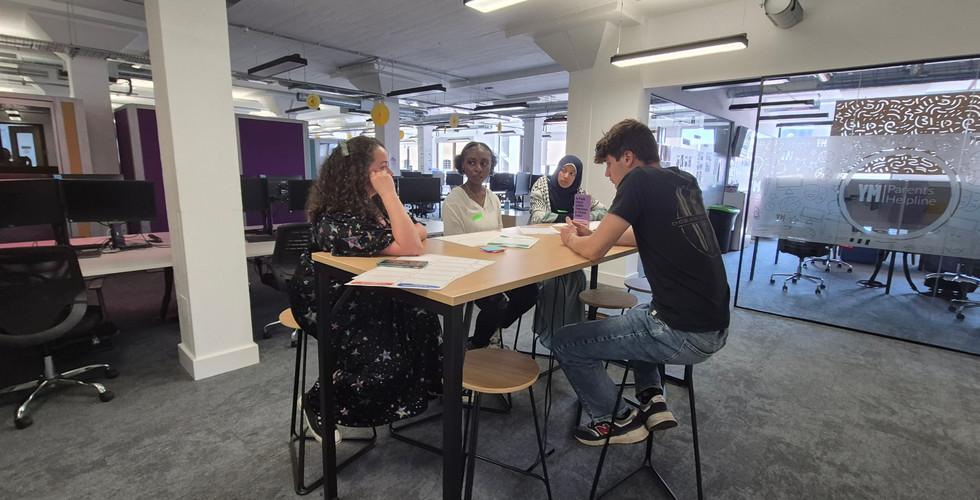COMPLETED ADOPTED PROJECT: Young people’s barriers to mental health services
Lead: Dr. Corine Driessens, Professor Peter W F Smith
Kim Markham Jones & Fiona Lacey – YoungMinds
Nicole Davenport, Mahdi Hassan, Shahrbano Iqbal, Friday Skelton – young researchers recruited by and in employ of YoungMinds
Starting date: October 2022
Ended date: September 2024
Many young people in the UK experience anxiety or depression, but most can’t get mental health support when they need it. From the very beginning of this project, young people, both as young researchers and as participants in four co-production workshops, played a central role in shaping our questions, interpreting the findings, and explaining what the results mean in real life. Their insight guided every stage of the work.
This study looked at what affects whether young people use mental health services and what happens to those who don’t. The biggest factor in getting help was whether health care professionals recognized the young person’s distress was a mental health disorder. Other things like, severity of symptoms, being a female, having fewer supportive people around, or having unemployed parents played a smaller role.
Young people who didn’t use services were less likely to be female, come from single-parent families, have caring responsibilities, or have been bullied. They were also more likely to have good relationships with their parents. Those who did use services had poorer outcomes later in adulthood, suggesting they faced greater difficulties overall.
Because specialist mental health services are overstretched, responsibility has shifted to GPs and teachers, who often feel under-resourced and not fully trained to meet these needs. The GPs we spoke to faced strict referral rules, long waiting lists, short appointments, and limited mental health training. The teachers we spoke to also felt pressure to support students without the resources or guidance they need.
After hearing these findings, a group of young people from the “missing middle” (those struggling but not qualifying for specialist care) recommended:
Training all school and college staff in mental health.
Better support for apprentices at work.
Peer support groups in schools, colleges, and universities.
Safe spaces and housing support for LGBTQIA+ students.
More help for young carers and fairer benefits.
Better training for all health workers to support diverse communities.
Looser referral rules so young people don’t have to be “ill enough” to get help.
Youth hubs offering safe spaces, activities, and mental health support.
Overall, the findings show the need for more inclusive, preventative, and joined-up mental health support for young people.
What did we find out?

Presented the findings at national and international conferences (e.g. MQ/DATAMIND, ADRUK, NIHR Statistics Group, EPA Epidemiology & Social Statistics, International Congress of the European Society for Child and Adolescent Psychiatry)
Presented the findings at ARC Wessex webinar
Presented findings on ARC Wessex website
Where next?
The young people who took part in our workshops were very clear about one thing: we need to start much earlier.
They told us that helping children learn emotional skills, like understanding their feelings, managing stress, and asking for help, before stigma takes hold could make a big difference in preventing mental health problems later on.
Taking this guidance seriously, our team has now grown to include experts who know how to design effective mental health programmes for primary schools, as well as researchers who can identify exactly which elements such a programme should include.
Our next step is to develop a primary school–based intervention shaped by what young people told us matters most. Because this type of work sits outside ARC Wessex’s remit, we are now seeking external funding to take the project forward and bring this early-intervention programme to life.
Olly Parker, Head of External Affairs and Research at YoungMinds, said: “This research from YoungMinds and the University of Southampton shines a vital light on the record numbers of young people needing mental health support. Growing up today is incredibly tough. Many young people are experiencing multiple pressures which impact their mental health, including poverty, inequality, intense academic pressure and the online world, so it’s no wonder so many are struggling.
One of the clearest recommendations from the young people involved is the urgent need for early support hubs in every community. We know many young people face long waits for mental health support and become more unwell while waiting, which can lead to needing more urgent care. We need major reforms to address the root causes of poor mental health and for the Government to focus on reducing waiting lists so young people can get the support they need. The recent 10 Year Health Plan showed promising commitments with Young Futures Hubs and Mental Health Support Teams. These initiatives are vital to reducing pressures on the system, improving support and reducing waiting times - their rollout must be a political priority. But more is needed to tackle the scale of need - we need radical solutions that will address the reasons why so many young people are struggling in the first place.”
Corine Driessens, one of the researchers based in Southampton, said:
“It has been a truly wonderful and positive experience working with these groups of young people. Their innovative and fresh ideas across a wide range of ways to help others get the mental health support they need have been inspiring.”




















